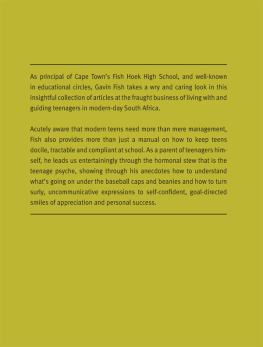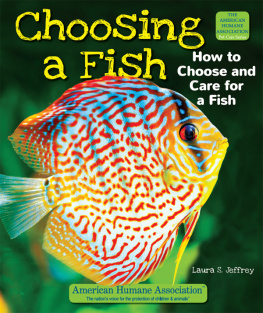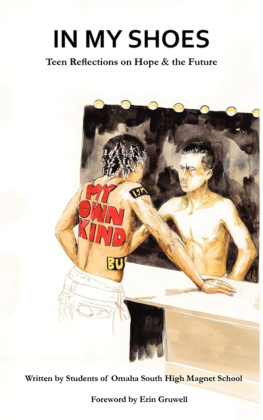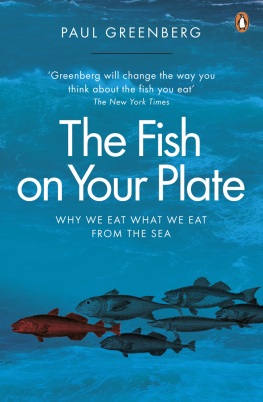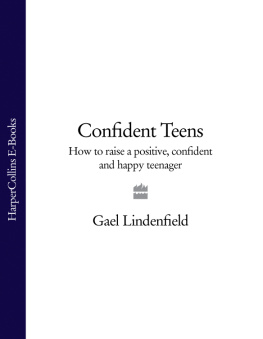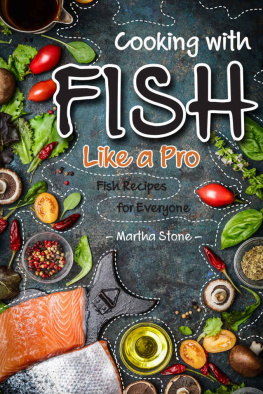
To my wife Kathy, the pectin in my jam!
CONTENTS
PREFACE
It was, I believe, Bill Cosby who said that before he had children, he had four theories on raising them, but now that he has four children he has no theories whatsoever.
I have a 16- and 13-year-old of my own and I have realised that it is easier to talk about teens than to actually live with them; many are the uncomfortable truths about myself that I have been forced to confront.
Yes, there is a difference between being the school principal of a 1 000 teens and coming home to your own two. I have enormous empathy for those whose relationship with their teens is rocky.
Still, I believe there are a great many truths that can go a long way to our understanding of each other. I have been privileged to work with intuitively gifted individuals; to have read, what I believe to be some of the finest writing on teens; and to have had many humorous and humbling experiences these past 25 years.
May this distillation of my journey into 96 bite-sized thoughts encourage, inspire and equip you for the hurly-burly of the teenage years.
Gavin Fish
SAVE ADOLESCENCE FOR THE ADOLESCENT
Is it now official? Does one become a teenager at age ten? Please help me out here. They dress the same, have the same haircuts, use the same language, listen to the same music but theyre shorter, have fewer pimples oh, and theyre ten.
I can hardly blame them. After all, being a teenager is terribly exciting when viewed from below. Which is exactly why, as parents and teachers, we need to keep youngsters young. Im not sure were doing that. To do it successfully we have to evolve into super-vigilant guardians of what our kids are exposed to. Do we know the images on our kids cellphones that groups of them stand sniggering over? Movie age restrictions are increasingly redundant; what is classified as no 213 is eye-poppingly graphic, both in terms of sex and violence and lets not start on video games, the Internet, or music that drips with sexual innuendo.
This is not ostrich head-in-the-sand stuff. On the contrary, we have to educate our kids at an ever-younger age about sex, in particular. We must be frank; seriously frank. The difference is that we must dictate the pace and tone of that exposure. We must expose in the context of our family values, so that there is something against which they can measure all this new excitement.
Wearing hipsters when you have no hips is just one mark of wannabe teenage hankering. Dont let it happen! Keep them so enthralled with being young so busy, so active, so within your radar of supervision that theyre content to be the age they are.
Chances are that these thoughts will not go down well with your preteen, but thats actually OK. Ride out their objections with loving insistence.
Go for it!
TEENAGERS HAVE TO LEARN TO FAIL FORWARDS
We did something very different in the Middle School last term, and were repeating it next week. We invited 20 pupils to join us on a stiff hike. Six of our staff chased them up to the top of Chapmans Peak, where we sat in the teeth of a cold, gale-force wind, in thick cloud, eating muffins and apples and drinking hot chocolate.
Later we all crammed into a wind-protected nook and spoke about failing forwards. A true mark of success is not that we never fail, but that we learn from our failures and become wiser through them. As Mohammed Ali said: Ive always stood up one more time than Ive been knocked down.
Why is it that our best experience comes from our worst experiences? As adults, we need to talk more openly about our personal failures. We need to demystify failure; to lighten up on it. We left the youngsters with the mantra that if they always do what theyve always done, then theyll always get what theyve always got. We challenged them to earn compliments rather than criticism.
Failure holds enormous terror for a teen, because failure and ridicule are roommates. In class, a teen will often say nothing, because once his or her answer was laughed at. But failure is a fact of life. Great entrepreneurs have succeeded, on average, on their fourth attempt, only after three prior failures. We have to encourage persistence and a good sense of humour. Teens have to understand that one is a failure not when one fails, but only when one stops trying.
We ran down the mountain and collapsed, exhausted but happy, in the car park below. Nope, I still dont like Kwaito, and not being a particularly tech-savvy individual, Im semi-ashamed to say I still dont have the vaguest idea about the newest MP3 players and formats that teens are into. But what was fantastic was that I got to spend time in a different environment, on a different agenda, with a bunch of teens. And we both enjoyed it, despite the next days cramps and bruises!
WHAT IS UNCOMFORTABLE IS NOT NECESSARILY IMPOSSIBLE
I cant do it, or, from the teenager, I wont do it, seldom means it is impossible to do it. As parents/teachers we have to wean young folk away from the notion that if something is difficult, uncomfortable or stressful, it is therefore completely impossible.
I take a perverse delight in holding up a thick matric file in front of a group of 13-year-olds and explaining to them that in four years time they will be managing all this work in just nine months. My marking was criticised in class a while back I had awarded a quite outstanding project 95 per cent and not 100. How could I be so mean? I explained that it wasnt perfect; that I wanted to stretch the pupil to strive always to improve and that there were shortcomings, however small, in the exceptional piece of work submitted.
All too often my athletes, who are happy to excel in front of their peers (with the minimum of effort), buckle at the next, inter-school level. They have not put in the hours required to be competitive at that level.
That catchy, long-forgotten hit song Do what you do do well, boy is as relevant today as it was way back then. A sound work ethic is foreign to many teenagers, but critically important.
By the way, in the mountains on Sunday past, my son would not jump off a rock into a pool five metres below. When I jumped in he leapt fearlessly, without a moments hesitation. It wasnt so impossible after all!
SAY YES
Say Yes as often as possible, because then, when you have to say No, it will be better received.
Stop yourself! Push your internal pause button before you cut your teen dead with an emphatic No! Ask yourself why youre saying No. After all, we were once teenagers has our forgetfulness grown with the years? No can often be a knee-jerk response that begs a little examination.
There is music beyond Neil Diamond. There are shoes other than Grasshoppers. A short-back-and-sides is no longer the coolest haircut around. We need to pick our fights I could easily interject No at least twice in every sentence uttered by my rambunctious nine-year-old (who is a preteen in biological years only). I must learn not to! Im not suggesting we cave in to our teens every request far from it! Its just that we ought to save our too-ready No for issues that undermine our familys values, rather than waste them on issues of fashion or personal preference.
Most teens have a need to be heard, a need to know that their requests are being taken seriously. If we can do that instead of the mid-sentence slapdown, chances are we will be better heard and heeded when the No is really necessary!
AGE-APPROPRIATE FREEDOMS
Give age-appropriate freedoms often.
Every child is on a headlong rush from the nappy stage to that of front-door key/credit card/car key. Their single-minded devotion to this cause is impressive, and leaves us as parents and teachers with a problem. Our every instinct is to protect and nurture, and to relinquish control very slowly, while theirs is to move in the opposite direction with their feet firmly on the accelerator. And we wonder why we clash so often?
Next page
